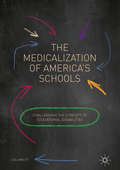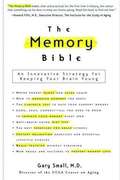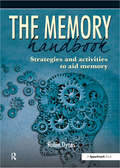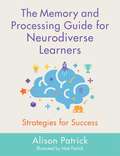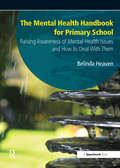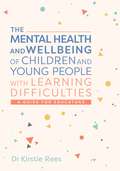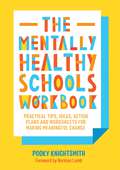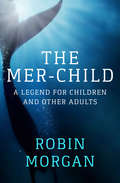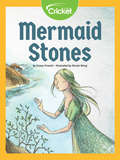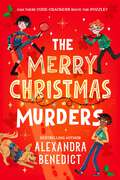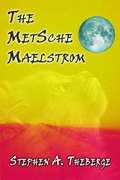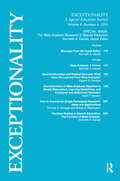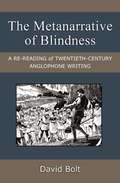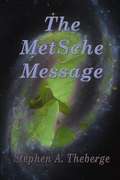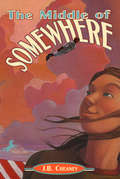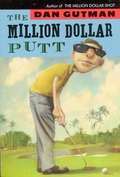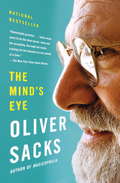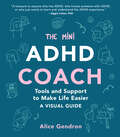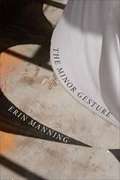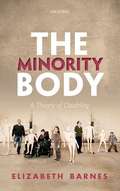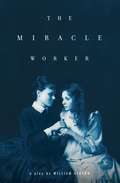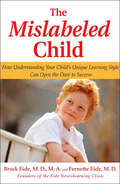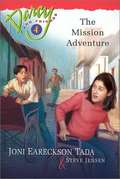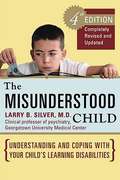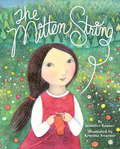- Table View
- List View
The Medicalization of America's Schools
by Joel MachtThis book challenges the validity of ADHD, learning disabilities, and dyslexia as meaningful special education "categories" and critically examines the misplaced medical model from which they are derived. The presumption that these disabilities cause school-related problems detracts from identifying factors within the classroom that create and maintain a child's underachievement and disruptive behavior. Moreover, when the disability is finally named, it provides no functional information that translates into effective coping strategies. Macht delves into the misunderstood structure of these disabilities, pointing out that they are not verifiable disabilities but weak constructs that poorly describe each child's uniqueness. Finally, he provides an alternative model based on children's strengths rather than their deficiencies, and presents strategies that advance school-related success.
The Memory Bible
by Gary SmallGary Small, M.D., is hhead of the Dept. on Aging at UCLA, and he and his colleagues have done research on age-related memory and cognitive disorders, dementia, and Alzheimer's Disease. For caregivers, their families, and patients who must cope with these disorders.
The Memory Handbook: Strategies and Activities to Aid Memory
by Robin DynesThis is a handbook full of practical ideas to use with anyone who is experiencing mild to severe memory difficulties. The suggestions and activities can be used when working with individuals or groups. The strategies can, in fact, be used by anyone young or old, who has become worried about loss of memory. The handbook provides: information about how memory works and different types of memory; an outline of what can affect memory; strategies to aid memory; activities to practice using the strategies; and activities to keep the brain active and maintain memory. The resource is aimed at staff in care environments such as residential homes, day centres, social clubs, support groups, carers or anyone who might be concerned about loss of memory. It promotes understanding about memory difficulties and provides a wide range of strategies and activities to aid response to individual need. Approximately 200pp; A4 wire-o-bound.
The Memory and Processing Guide for Neurodiverse Learners: Strategies for Success
by Alison PatrickArmed with the wealth of understanding and strategies in this guide, students will discover how they can learn best, to make studying and revision more effective (and less stressful).Packed with simple, tried and tested strategies and workarounds, this study guide for supporting kids and teens who learn differently (such as those with ADHD, dyslexia, dyspraxia or ASD) explains what memory and processing issues are, and how to work around them. Written by a tutor and specialist with years of experience of working with students with learning differences, this book enables the student to understand the best ways they learn and the reasons behind this. Unpacking processing speed, sensory processing, metacognition, and executive functioning, including working memory, this uniquely relatable and empowering study guide will provide students with the self-understanding they need to manage exams and academic tasks at school with confidence and peace of mind.
The Mental Health Handbook for Primary School: Raising Awareness of Mental Health Issues and How to Deal with Them
by Belinda HeavenThe stigma attached to mental health and the social barriers that surround it amplify its direct effects and damage the life chances of people with mental health problems. Department of Health (2011) Educating children and young people about mental health is of vital importance if we are to challenge the ignorance and stigma related to this area of health. Many young people will be living in families where an adult member may have mental health problems or indeed may be facing similar problems themselves. This book provides a comprehensive resource to help teachers deal sensitively with this important area. Part One provides an introduction and background information highlighting the need to tackle Mental Health in primary schools. The facts are startling - 10% of 10-16 year olds have a diagnosed mental health disorder, there is an increasing number of children self-harming and an alarming increase in early eating disorders. This section provides clear guidance on how to use the programme, including working with parents and answering questions children may ask. Part Two details a comprehensive PowerPoint presentation introducing staff to the programme. Part Three provides wide-ranging lesson materials with comprehensive teacher notes and including all the necessary copiable resources for using the programme from years 3 through to 6. Part Four has a Glossary of Terms as well as a valuable Resource Directory to direct the busy teacher to other useful sources of information. The accompanying downloadable resources include: activity pages; a model letter for parents; and, staff PowerPoint.
The Mental Health and Wellbeing of Children and Young People with Learning Difficulties: A Guide for Educators
by Kirstie ReesKnowing when children and young people are struggling, and identifying the best ways of supporting them is vital. This is all the more important when working with children with varying learning difficulties who may not always be able to communicate their feelings.By demystifying terms such as mental health, wellbeing, learning difficulties and the sensitivities surrounding labels, this practical and evidence-based guide helps you achieve an in-depth understanding of the children and young people you work with. It provides you with skills and knowledge for supporting their mental health and wellbeing in educational settings - from nursery to secondary school in both mainstream and specialist environments with talking and non-verbal communication approaches to accommodate varying needs. Most importantly its holistic approach explores the interaction between the child's learning difficulties and the psychological, social and environmental factors which influence how they manage their ups and downs in life. This lets you think beyond the child and the classroom.
The Mentally Healthy Schools Workbook: Practical Tips, Ideas, Action Plans and Worksheets for Making Meaningful Change
by Pooky KnightsmithThis book is the perfect starting point for anyone looking to promote and encourage mental health in their school, or evaluate their existing provision, in line with current government priorities. It covers not only the day-to-day practical steps you can take to meet the mental health needs of learners, but also a provides a whole bank of ideas for ensuring you adopt a whole-school approach to positive mental health. Pooky Knightsmith lays out tried and tested tools you can use to evaluate the overall mental health of a school, showing how to improve and support the mental health of staff, and how to ensure that the voice of every learner is heard and valued, including the most vulnerable - and that everyone involved with the school feels safe, healthy and happy. Pooky's simple 'litmus test' framework lays out six practical areas you can explore to implement change within your own school, with explanations, sheets to fill in, tips from loads of school staff, and case examples that break these ideas down into easily digestible chunks. This much-needed book is a jumping off point for meaningful change in all aspects of your school community that will promote, support and strengthen mental health at whole-school level.
The Mer-Child: A Legend for Children and Other Adults
by Robin MorganLove transcends all barriers in this modern fairy tale When the Mer-Child learned the story of the Little Mermaid, he recognized it as the account of his mother and father, the beautiful mermaid and the human man for whom she sacrificed everything. But that love had left their offspring, the Mer-Child, stranded between worlds, as unwelcome in the realm of the sea as in the earth above. Never fitting in, he has been left to wander, searching for friends, his silvery tail fluttering mournfully in the waves. One day he notices a little girl sitting on the beach. Her father must carry her to and from the shore each day because her legs are paralyzed. Her father is black, her mother white, and she is as much an outcast in both communities as the Mer-Child is in his own. Slowly, warily, they find kinship, both in their differences and in their similarities, and they form a bond that changes them forever. What each learns about the value of being different makes this modern-day fairy tale a new classic, with two memorable characters and an enduring message.
The Mermaid Stones
by Claire H. BlatchfordOne day, Thady O’Dowd finds the magical cloak of a mermaid. Knowing that the mermaid, Miranda, can only return to the sea with her cloak, he hides it away in the hope that she will marry him. After many years, Thady is forced to reveal the hidden cloak. Will Miranda be able to forgive him?
The Merry Christmas Murders: a thrilling new murder-mystery series
by Alexandra BenedictMurder is AFOOT in this brand new murder-mystery series by leading adult crime writer, Alexandra Benedict. Perfect for fans of Robin Stevens and the Curious Incident of the Dog in the Night-time with a puzzle hook for middle grade readers&‘Sometimes, to solve the toughest crimes, you need to see the world differently…enter our group of ND supersleuths. Not since the London Eye Mystery has an author championed the beauty of difference so enjoyably.&’ Phil Earle'A deliciously clever festive mystery, brimming with heart, humour, and a cast of sleuths you'll cheer for on every page. I devoured it in one sitting.' Jenny Pearson Every year, six local schools compete to win the Christmas Cup. Last year, the rival school to Brooke Parkin&’s school won for the most crackers pulled in a minute! This year, the cup will be judged and awarded to the school with the perfect mince pie. But when a series of murders seemed to be linked to the very mince pies (each with a clue from a letter from the alphabet imprinted in the pastry) the five neuro-divergent children must turn detective and combine their skill sets to find the killer. Can they prevent another death and save their out-of-school club from being shut down forever . . .?Perfect for ChristmasIntricately weaved murder-mystery seriesAuthentic representation of neuro-divergency featuring characters with ADHD, autism, dyslexia, dyscalculia
The MetSche Maelstrom
by Stephen A. ThebergeAs the story begins, there is deep discord in the MetSche Alliance. In addition, a rogue MetSche hybrid, Padma, is determined to escape her place of birth and rule Earth with the cruelty that she herself experienced in youth. Andre, the human recipient of the profound MetSche message that was delivered in the prequel to this book, is wracked with guilt concerning his previous drug addiction, as well as with grief following the death of his long-time lover, John. Attempting to come to his aid is Min, a kindly MetSche hybrid disguised as a cat. Andre, knowing that he must have further training before he can seek employment and attain stability, finds himself strongly drawn to the somewhat mysterious Jared at a vision rehabilitation center. Is there any hope or a relationship with him? And what of the beautiful planet with the yellow sky and the turquoise moon? Who are the benevolent but non-corporeal beings who show all this to Andre? In this sequel to The MetSche Message, the author presents us with a true maelstrom of emotions and conflicts. Journey along with him to the surprise ending for all the main characters, both human and alien.
The Meta-Analysis Research in Special Education: A Special Issue of Exceptionality
by Kenneth A. KavaleFirst published in 2001. The purpose of this issue is to demonstrate the advantages of meta-analysis in summarizing research in special education. Toward this end, five articles are included in this issue that deal with methodology, interpretation, and application of meta-analyses. The first article is a brief primer on meta-analysis that compares and contrasts it with more traditional review methods and describes the methodological procedures for conducting a quantitative research synthesis. The second article, summarizes findings from 24 meta-analytic efforts. The third article explores the important issue of face validity: Can we be confident about the findings from meta-analyses? The fourth article examines the controversy surrounding the meta-analysis of single-participant research: What is the best metric? The final paper reviews the process of decision making in special education by showing how meta-analytic findings can provide a comprehensive knowledge base that, combined with wisdom and experience, can be used to decide whether to include particular interventions.
The Metanarrative Of Blindness: A Re-reading Of Twentieth-century Anglophone Writing
by David Bolt<P>Although the theme of blindness occurs frequently in literature, literary criticism has rarely engaged the experiential knowledge of people with visual impairments. The Metanarrative of Blindness counters this trend by bringing to readings of twentieth-century works in English a perspective appreciative of impairment and disability. Author David Bolt examines representations of blindness in more than forty literary works, including writing by Kipling, Joyce, Synge, Orwell, H. G. Wells, Susan Sontag, and Stephen King, shedding light on the deficiencies of these representations and sometimes revealing an uncomfortable resonance with the Anglo-American science of eugenics. <P>What connects these seemingly disparate works is what Bolt calls “the metanarrative of blindness,” a narrative steeped in mythology and with deep roots in Western culture. Bolt examines literary representations of blindness using the analytical tools of disability studies in both the humanities and social sciences. His readings are also broadly appreciative of personal, social, and cultural aspects of disability, with the aim of bringing literary scholars to the growing discipline of disability studies, and vice versa. This interdisciplinary monograph is relevant to people working in literary studies, disability studies, psychology, sociology, applied linguistics, life writing, and cultural studies, as well as those with a general interest in education and representations of blindness.
The Metsche Message
by Stephen ThebergeYoung Andre, with his severe visual disability, experiences years of alienation, frustration, and abiding sadness in the face of human beings' cruelty to one another. At his boarding school for the blind and then later at college, his sources of joy are few: good food, music, and computer science-and eventually, the arms of his lover, John. Only in middle age does he learn that he and a very few others have been chosen by two far superior alien races to deliver a crucial message to all of humankind. The story is told primarily in the form of a long account of Andre's life: from his very earliest memories of being a visually impaired baby to the stunning visions of their planets imparted to him by the aliens, the Metans and Schegnans. Along with allowing him to view their beautiful present worlds, they show him the extremely violent past that they have evolved beyond. Can human beings ever do the same? Will Andre, John, and the two psychiatrists who are also privy to the aliens' powerful message be able to convince others on Earth to listen and learn?Readers are left to imagine their own answers to these questions. What they could never doubt are the emotion and deep humanity from which this imaginative and poignant story obviously springs.
The Middle of Somewhere
by J. B. CheaneyVeronica Sparks is hitting the road! She has practically memorizedSeize the Way: Ten Weeks to SuperSize Your Life!and she is going to shake the dust of her little town off her shoes and see the world! Well, someday. For now she's hitting the road in an RV with her cantankerous grandfather at the wheel and her hyperactive little brother in the backseat. Ronnie's grandfather is a wind prospector, and they are heading across Kansas in search of a good stiff breeze. Okay, so it's not the trip of her dreams. But with her newly affirmatized attitude, Ronnie figures that travelling somewhere is better than travelling nowhere. That is, until her little brother manages to disappear into thin air. . . . On one weird, windy, wild ride across the prairie, Ronnie discovers that there are some things you just can't plan for or seize control of—but that sometimes a little chaos is just what a girl needs.
The Million Dollar Putt
by Dan GutmanBlind golfing, anyone? Edward Bogard, Bogie for short, may be blind, but he can learn just about anything he sets his mind to: riding a bike, parasailing, playing guitar. Even though many things come easily to him, he stunned when he hits at a driving range and finds he has the swing of a pro. But blind golfing is a team sport, and Bogie needs a coach. Enter Birdie, the kooky and mysterious girl next door. A bit of a loner, Birdie creates elaborate worlds in miniature in her basement, and has managed to make it to age twelve without learning to ride a bike. Then someone anonymously enters Bogie in a golf tournament with a million dollar prize. If he can team up with Birdie to conquer the greens of Hawaii, could she be the unlikely key to victory?
The Mind's Eye
by Oliver SacksIn The Mind's Eye, Oliver Sacks tells the stories of people who are able to navigate the world and communicate with others despite losing what many of us consider indispensable senses and abilities: the power of speech, the capacity to recognize faces, the sense of three-dimensional space, the ability to read, the sense of sight. For all of these people, the challenge is to adapt to a radically new way of being in the world. There is Lilian, a concert pianist who becomes unable to read music and is eventually unable even to recognize everyday objects, and Sue, a neurobiologist who has never seen in three dimensions, until she suddenly acquires stereoscopic vision in her fifties. There is Pat, who reinvents herself as a loving grandmother and active member of her community, despite the fact that she has aphasia and cannot utter a sentence, and Howard, a prolific novelist who must find a way to continue his life as a writer even after a stroke destroys his ability to read. And there is Dr. Sacks himself, who tells the story of his own eye cancer and the bizarre and disconcerting effects of losing vision to one side. Sacks explores some very strange paradoxes-- people who can see perfectly well but cannot recognize their own children, and blind people who become hyper-visual or who navigate by tongue vision. He also considers more fundamental questions: How do we see? How do we think? How important is internal imagery or vision, for that matter? Why is it that, although writing is only five thousand years old, humans have a universal, seemingly innate, potential for reading? The Mind's Eye is a testament to the complexity of vision and the brain and to the power of creativity and adaptation. And it provides a whole new perspective on the power of language and communication, as we try to imagine what it is to see with another person's eyes, or another person's mind.
The Mini ADHD Coach: Tools and Support to Make Life Easier—A Visual Guide
by Alice GendronAn inclusive guide to ADHD that explores its diverse types, symptoms, diagnoses, and misconceptions, and shares how to work with your ADHD brain to fully understand yourself.Diagnosed at 29, Alice Gendron offers full and supportive insight into life with ADHD, addresses common challenges and hurdles, and provides tips and ADHD hacks that will help you to get things done and live a more peaceful daily life. This illustrated and informative guide is a must-have for anyone looking to better understand ADHD and how to thrive with ADHD. Through Gendron’s motivational voice and relatable illustrations, The Mini ADHD Coach will teach you: How to emotionally process your ADHD diagnosis.How ADHD can impact your daily life, from getting your morning started to time management, dating, making dinner, and more.What ADHD expressions, such as analysis paralysis, hyperfocus, and time blindness, really mean.ADHD hacks like habit-stacking and gamification to try out and find the solutions that fit your life. The Mini ADHD Coach is the perfect resource for flourishing with ADHD.FIRST TRULY ACCESSIBLE SELF-HELP BOOK FOR ADHD READERS: While there are many books about ADHD, this is a unique graphic approach that explores ADHD from daily challenges and how to overcome them to a comprehensive overview of everything you need to know. This book offers a great resource for readers of all ages with its accessible illustrations and thorough content, which is timely and essential given the increase of diagnoses of ADHD in children and women around the world.POPULAR EXPERT AUTHOR: Alice Gendron’s style and approach have struck a chord internationally, with a rapidly growing audience of nearly a half-million social media followers—including a strong following across her foreign-language accounts in Spanish, Portuguese, French, and Japanese. Her growing website (theminiadhdcoach.com) has thousands of monthly visitors from across North America.A VITAL ADDITION TO ADHD BOOKSHELVES: For anyone diagnosed with or supporting family or friends with ADHD, this is a practical and informative guide to read along with such ADHD books for adults as Neurotribes, Invisible Women, Women with ADHD, The End of Average, Unwell Women, Divergent Mind, Your Brain’s Not Broken, Mother Brain, Still Distracted After All These Years, Taking Charge of ADHD, Taking Charge of Adult ADHD, Hyperbole and a Half, Solutions and Other Problems, and Am I There Yet?Perfect for:Readers age 15+ with ADHD or those who believe they may have ADHD and are looking for better understanding and a diagnosisParents looking for guidance for their children with ADHDAnyone interested in learning more about ADHD or how to support their friends/family with ADHDFans of informative graphic nonfiction titlesTeachers seeking tools to support students with ADHDFans of Alice Gendron and @the_mini_adhd_coach
The Minor Gesture
by Erin ManningIn this wide-ranging and probing book Erin Manning extends her previous inquiries into the politics of movement to the concept of the minor gesture. The minor gesture, although it may pass almost unperceived, transforms the field of relations. More than a chance variation, less than a volition, it requires rethinking common assumptions about human agency and political action. To embrace the minor gesture's power to fashion relations, its capacity to open new modes of experience and manners of expression, is to challenge the ways in which the neurotypical image of the human devalues alternative ways of being moved by and moving through the world--in particular what Manning terms "autistic perception." Drawing on Deleuze and Guattari's schizoanalysis and Whitehead's speculative pragmatism, Manning's far-reaching analyses range from fashion to depression to the writings of autistics, in each case affirming the neurodiversity of the minor and the alternative politics it gestures toward.
The Minority Body: A Theory of Disability
by Elizabeth Barnes<p>Elizabeth Barnes argues compellingly that disability is primarily a social phenomenon--a way of being a minority, a way of facing social oppression, but not a way of being inherently or intrinsically worse off. This is how disability is understood in the Disability Rights and Disability Pride movements; but there is a massive disconnect with the way disability is typically viewed within analytic philosophy. <p>The idea that disability is not inherently bad or sub-optimal is one that many philosophers treat with open skepticism, and sometimes even with scorn. The goal of this book is to articulate and defend a version of the view of disability that is common in the Disability Rights movement. Elizabeth Barnes argues that to be physically disabled is not to have a defective body, but simply to have a minority body.</p>
The Miracle Worker: A Play
by William GibsonNO ONE COULD REACH HER Twelve-year-old Helen Keller lived in a prison of silence and darkness. Born deaf, blind, and mute, with no way to express herself or comprehend those around her, she flew into primal rages against anyone who tried to help her, fighting tooth and nail with a strength born of furious, unknowing desperation. Then Annie Sullivan came. Half-blind herself, but possessing an almost fanatical determination, she would begin a frightening and incredibly moving struggle to tame the wild girl no one could reach, and bring Helen into the world at last....
The Mislabeled Child: How Understanding Your Child's Unique Learning Style Can Open the Door to Success
by Brock Eide Fernette EideAn incredibly reassuring approach by two physicians who specialize in helping children overcome their difficulties in learning and succeeding in schoolFor parents, teachers, and other professionals seeking practical guidance about ways to help children with learning problems, this book provides a comprehensive look at learning differences ranging from dyslexia to dysgraphia, to attention problems, to giftedness. In The Mislabeled Child, the authors describe how a proper understanding of a child's unique brain-based strengths can be used to overcome many different obstacles to learning. They show how children are often mislabeled with diagnoses that are too broad (ADHD, for instance) or are simply inaccurate. They also explain why medications are often not the best ways to help children who are struggling to learn. The authors guide readers through the morass of commonly used labels and treatments, offering specific suggestions that can be used to help children at school and at home. This book offers extremely empowering information for parents and professionals alike.The Mislabeled Child examines a full spectrum of learning disorders, from dyslexia to giftedness, clarifying the diagnoses and providing resources to help. The Eides explain how a learning disability encompasses more than a behavioral problem; it is also a brain dysfunction that should be treated differently.
The Mission Adventure (Darcy and Friends)
by Joni Eareckson Tada Steve JensenAlthough beeing in a wheelchair will make the trip difficult, Darcy feels called to go with members of her church on a mission to Guatemala where she and her sister help a deaf orphan. <P><P><i>Advisory: Bookshare has learned that this book offers only partial accessibility. We have kept it in the collection because it is useful for some of our members. Benetech is actively working on projects to improve accessibility issues such as these.</i>
The Misunderstood Child, Fourth Edition: Understanding and Coping with Your Child's Learning Disabilities
by Larry B. Silver M.D.The fully revised and updated must-have resource to help you become a supportive and assertive advocate for your childIn print for more than twenty years, The Misunderstood Child has become the go-to reference guide for families of children with learning disorders. This newly revised edition provides the latest research and new and updated content, including:• How to identify and address specific disabilities, from dyslexia to sensory integration disorder• New information on the genetics of learning disorders• Expanded sections on attention-deficit/hyperactivity disorder (ADHD)• The most recent neurological discoveries about how the brain functions in children with learning disabilities• Insights about other neurological disorders common among individuals with learning disabilities, such as anxiety disorders, obsessive-compulsive behaviors, anger-control problems, depression, and tic disorders• Resources, Web sites, and organizations that can aid the treatment process and offer support for both parent and child
The Mitten String
by Kristina Swarner Jennifer RosnerAn original Jewish folktale about a girl who knits, a deaf woman, and a piece of blue yarn. When her family invites a deaf woman and her baby to stay, Ruthie, a talented knitter of mittens, wonders how the mother will know if her child wakes in the night. The surprising answer inspires Ruthie to knit a special gift that offers great comfort to mother and baby--and to Ruthie herself. With language and imagery reminiscent of stories told long ago, this modern Jewish folktale will resonate with those who love crafts, anyone who's encountered someone who is physically challenged--and with everyone who has ever lost a mitten in the depths of winter.
